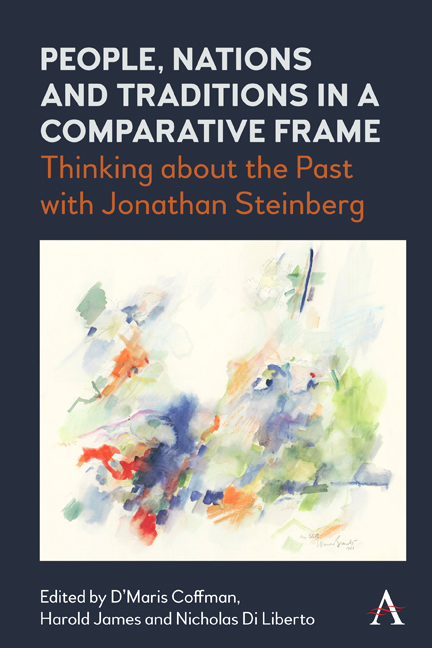 People, Nations and Traditions in a Comparative Frame
People, Nations and Traditions in a Comparative Frame Book contents
- Frontmatter
- Contents
- Foreword
- Acknowledgements
- Notes on Contributors
- Introduction
- Part One Methodological Pluralism and New Applications
- Part Two Personal and National Character
- Part Three Society, Families and the Sovereign Self
- Part Four History Out of Sync: Modernity and Tradition
- Part Five History, Narrative and the Human Condition
- Afterword
- Bibliography of Jonathan Steinberg’s Works
- Index
Chapter One - All or Nothing: From Comparative to Transnational History
Published online by Cambridge University Press: 23 February 2022
- Frontmatter
- Contents
- Foreword
- Acknowledgements
- Notes on Contributors
- Introduction
- Part One Methodological Pluralism and New Applications
- Part Two Personal and National Character
- Part Three Society, Families and the Sovereign Self
- Part Four History Out of Sync: Modernity and Tradition
- Part Five History, Narrative and the Human Condition
- Afterword
- Bibliography of Jonathan Steinberg’s Works
- Index
Summary
Concluding his introduction to the second edition of All or Nothing, Jonathan Steinberg designates the rarity of the comparative approach as the reason not to consign the book to the nothingness of ‘out of print’. Nonetheless, in the characteristic ambivalence of the comparative historian, he affirms the value of comparison only amid multiple cautions:
Comparative history might well fit G.K. Chesterton's witty observation about Christianity. ‘The Christian ideal has not been tried and found wanting; it has been found difficult and left untried.’ Comparative history is like that, difficult and left untried, and there are good reasons. Comparative history is bad for academic careers. The devoted comparatist is never entirely at home in one field or the other. In these days of information overload, the comparatist can never keep up with recent research in both fields. Frequently comparative historical work drops into the cracks between one major historical tradition and another and gets noticed by neither.
The comparative historian suffers when compared to the specialist. Career concerns, time and historiographical tradition conspire to hinder the enterprise. Small wonder, as Susan Pederson observed, that so many comparative historians regress to the norm and follow their first project with a second work specialized in national history. Comparative history is idealized more than practiced, and more practiced than theorized. Its claim to importance is proportional to the extent it contradicts traditional historical practice.
This essay seeks to identify the advantages and disadvantages of comparative history, at a moment when the adjective and the approach has ceded its place to the ‘transnational’. Never fully embraced by the historical profession, comparative history now appears positively archaic, a relic from before the rise of transnational histories. However, rather than simply herald the onward march of transnationalism, this essay seeks, via an analysis of the comparative approach, to identify the difficulties and dangers of transnational history.
The Challenges of Comparison
The manifold difficulties of comparative history have long been delineated. The comparative project renders more complex the archival, linguistic, historiographical and narrative demands of historical research and writing. At a minimum, the comparative approach multiplies the typical problems of archival research. All historians must deal with the absences of archival evidence, gaps in the records and the partial nature of historical evidence. Such perils are only exacerbated in comparative history.
- Type
- Chapter
- Information
- People, Nations and Traditions in a Comparative FrameThinking about the Past with Jonathan Steinberg, pp. 11 - 26Publisher: Anthem PressPrint publication year: 2021


